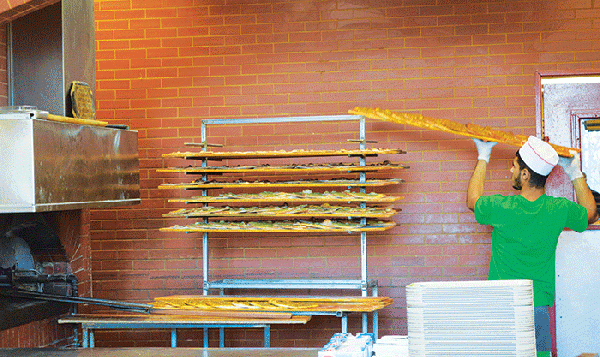DEARBORN — Driving down the streets of this city, one senses the spirit of a culture yearning to be revived by those who have been uprooted from their homelands. Dearborn has become a major hub for the kinds of restaurants, cafés and shops that were once only found on the streets of the Middle East.
Recently, there has been a local surge in appetites for what Arabs consider to be a cultural token – bakeries. Dearborn has at least 13 bakeries, specializing in mana’eesh (a popular Levantine pie topped with zaatar, cheese or meat), fatayer (smaller, stuffed pies), Arabic sweets and pita bread, among other pastries.
These bakeries, as with any bread-producing establishments, are considered to be an essential part of the local culture and identity.
History of local Arabic bakeries
Most local major bakery owners, as well as Ali Jawad, founder of the Lebanese Heritage Club, agree that a man named Saleh Hmayyed was one of the first bakers to open a small shop on Dix Road in the late 70’s.
Hmayyed made mana’eesh and other small pastries.
The oldest established bakery in Dearborn, however, was Cedars Bakery, which opened in 1980 in East Detroit (now Eastpointe) and is now located on Warren Avenue.
Mohsin Shhab, Cedars Bakery’s founder, said Arabs from all over the United States flocked to his bakery to get a taste of their homeland’s baked goods. Now, the bakery produces a popular brand of pita bread that delivers to restaurants and grocery stores across the nation.
As the Arab population grew, another bakery followed. New Yasmeen Bakery, just a few blocks east of Cedars, set up shop in 1987. It moved to its new location in 1992.
New Yasmeen differs from traditional bakeries. Its spacious interior features a showcase that lines the entire store. One side offers sweet pastries; the other is a deli-like setting that sells mana’eesh, hot foods and lunch meals.
As you wait for your mana’eesh, a baker crafts his bread in a brick oven, like an artist blowing glass putting on a performance.
The counter next to him is a refrigerated showcase featuring a line of traditional homemade Lebanese foods, like vegetarian grape leaves and mujaddarah.
It also includes a restaurant-style seating area and a corner with Middle Eastern groceries and snacks.
“A lot of people come from out of state; they become like kids at a candy store,” said Hussein Siblani, co-owner and son of New Yasmeen’s founder.
He said Arabic bakeries are becoming more popular in the community because they bring a taste of home outside of the homeland. Siblani has even partnered with others to open a new bakery in Dearborn Heights, as they saw the market expanding westward.
They opened Saj on Ford Road.
Siblani said they introduced the idea of incorporating hot foods into bakeries, transforming the meaning of bakeries in the area. He added that although their concept is not traditional, there was a positive response from the community and the bakery gradually introduced a wider variety of foods.
Now, long lines gather at the busy Dearborn Heights bakery on weekends, as it became a popular destination for a Lebanese breakfast.

The mini-pizza was born
Some of the bakery’s most popular pastries are mini-pizza pies, which Siblani said New Yasmeen created and is now being made and sold in almost every local Arabic bakery.
Both Cedars and New Yasmeen bakery owners claim to be the creators of the miniature pizza.
“We introduced new items that didn’t even exist in Lebanon,” Siblani said. He added that other bakeries selling their original product is a compliment to their innovation.
Today, the bakery owns a large warehouse, which manufactures a household name pita bread line sold in major grocery shops like Meijer, Kroger and Walmart.
Dearborn Golden Bakery, just a few blocks west of Cedars, opened shortly after New Yasmeen. Dearborn Golden subsequently moved to its current location in 1999. It also offers a popular pita bread line and owns a 20,000 square foot distribution warehouse nearby. Just like New Yasmeen, Dearborn Golden sells Middle Eastern groceries, snack and sweets.
Innovation in bakeries
“Here in America, it is a totally different ball game; you can’t just stick to mana’eesh,” said Jawad, the Lebanese Heritage Club founder.
Jawad said Middle Eastern bakeries put Dearborn on the map because of the rising popularity of Arabic foods among Americans.
He encouraged entrepreneurs to open new bakeries outside of Dearborn to introduce Middle Eastern pastries to those not familiar with the cuisine.
Ahmed Slim, son of the founder of Fordson Bakery on Warren, echoed Jawad’s comments.
“Our community is not just Lebanese; you have Palestinians and others who don’t eat the same stuff,” Slim said, adding that Fordson Bakery also sells sandwiches, falafel and kibbe.
According to Slim, Fordson was the fourth bakery to open in the area.
He said businesses have to be more innovative to remain competitive.
However, Amir Abed, owner of Al-Nour Bakery on Warren, which only sells mana’eesh, disagrees with the notion that bakeries should sell hot foods.
“If someone wants falafel, they’ll go to a restaurant, not a bakery,” Abed said.
There are plenty of zaatar pies in Beirut. But only in Dearborn you can get a mini-pizza, shawarma sandwich, piece of cake and zaatar pie from the same business.






Leave a Reply